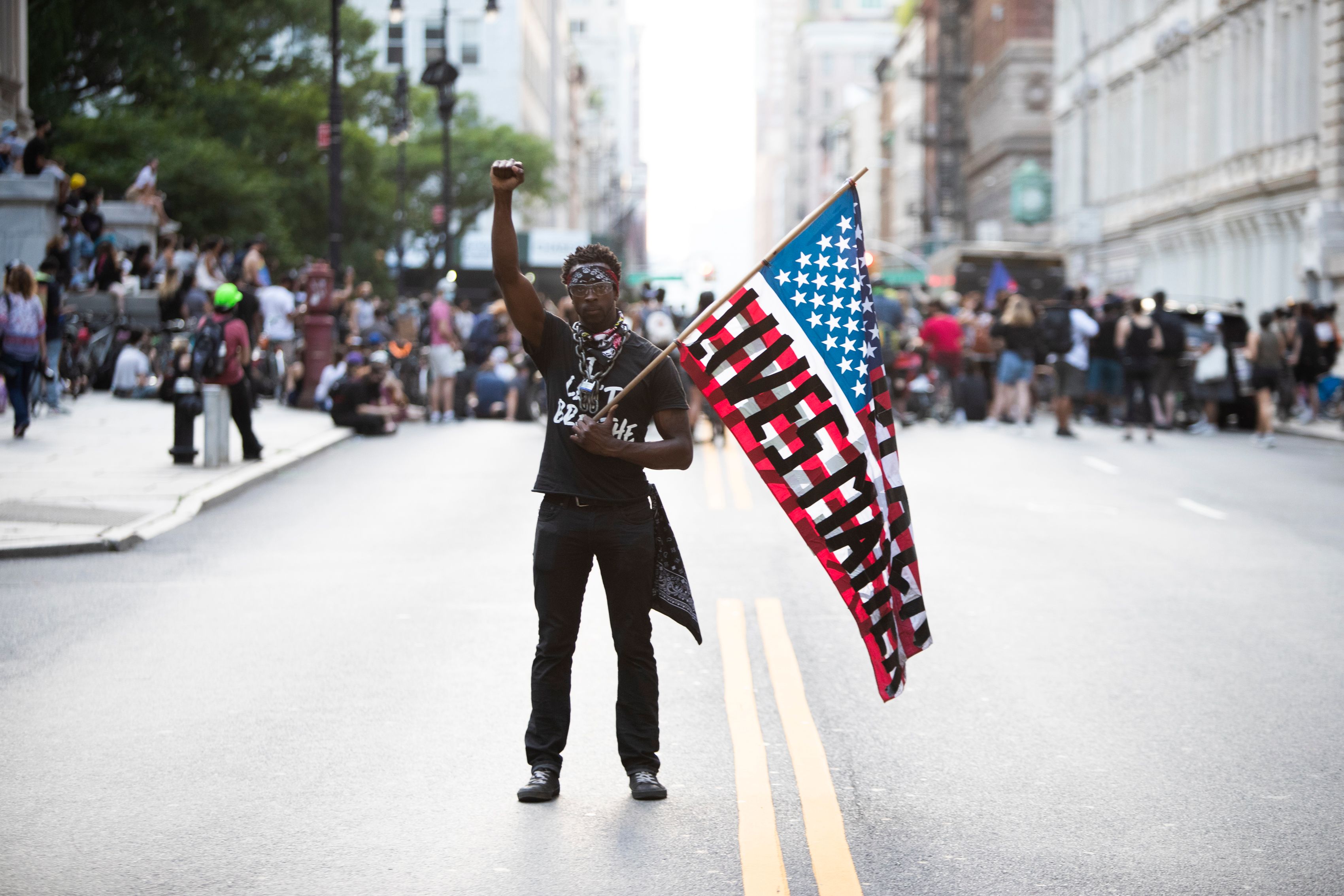Pandemic and Protests: Impacts on the Socio-Political Situation in the U.S.

Economic Situation
The COVID-19 pandemic in the U.S. is still raging and despite an improvement in the economic situation after the first month restrictions were lifted in some areas, it is unclear whether the U.S. economy will be affected a second time. The GDP decline in the first quarter of this year amounted to 4.8%, and in the second quarter may exceed 10% as a result of the lockdowns in April and part of May. However, a rebound had been expected in the third and fourth quarters, although the pre-pandemic GDP levels will not be reached until 2022. It is uncertain though whether these forecasts will be met because of the drastic increase in new cases of COVID-19 cases detected—now at a record level of more than 50,000 a day—at the turn of June to July and the possibility of a slowdown in re-opening the economy, or in an extreme case, re-closing it.
Stimulus packages enacted by the federal government increased public debt by more than $3 trillion (total debt is now $26.5 trillion). Since March, more than 48 million Americans have applied for unemployment, which in June was 11.1%. The peak so far came in April, at 14.7%, up from the “pre-pandemic” month of February when it was 3.5%. The pandemic dramatically ended the 113-month growth cycle of new jobs and cut overall employment to that of September 2010. However, data from May and June gave reasons for optimism—an increase of 2.7 million and 4.8 million new jobs was recorded, respectively.
Social Tensions
In late May, a black man, George Floyd, was killed while being arrested by police in Minneapolis. This resulted in an outbreak of protests, including rioting in the first weeks. The protesters demand reforms such as dismantling police departments (replaced by new organisations with fewer powers) or “defunding” or cutting funding, and training to reduce cases of brutality by police. The protests have highlighted the public debate over “systemic” racism towards the minorities in the U.S., which, besides police actions, also is manifested in other ways such as fewer opportunities on the labour market and worse access to healthcare. The latter problems were exacerbated by the pandemic. Black Americans account for 25% of COVID-19 deaths, although they are just 13% of the population. The economic effects of the pandemic are also more severe for this minority. While in May unemployment among whites fell from 14.2% to 12.4%, among black Americans it continued to rise, peaking at 16.8% before declining in June to 15.4%.
Some protesters are attempting to take on history, especially the unofficial reverence for the Confederate States of America and the South during the Civil War (1861-1865). Monuments, not only of Confederate commanders but also those of colonisers and American presidents who owned slaves, began to be desecrated or torn down. Voices calling for a ban on displaying the Confederate flag have strengthened. Authorities in some states in recent years took on the issue but that effort has intensified. The Mississippi legislators voted to change the state flag, which includes the Confederate battle flag, and the mayor of Richmond, Virginia (the former capital of the Confederacy), ordered the immediate removal of Confederate monuments from the city. In addition, the racing sport NASCAR, which has a strong tradition in the South, has banned displaying Confederate flags.
Political Discourse
The cooperation on the pandemic response between Democrats and Republicans, which in the beginning resulted in stimulus packages worth a total of almost $3 trillion, has been suspended. The last stimulus act was adopted in April when $484 billion was allocated for small business loans. In May, the House of Representatives, controlled by Democrats, voted another package worth an additional $3 trillion. It included funds for state and local authorities and hospitals, another series of one-time direct payments to citizens, rental aid, and an extension of unemployment benefits and food stamps. Republicans, though, oppose it and it was not picked up in the Senate, under their control. At the beginning of July, however, Congress adopted and President Donald Trump signed a law extending (until 8 August) the Paycheck Protection Programme (PPP), ensuring that the remaining $125 billion allocated for this purpose as part of earlier aid packages could be used. At the same time, Republicans see the need to adopt another stimulus, but probably a limited version. Infrastructure investments and new jobs are the president’s priority.
The ongoing protests have forced both parties to undertake reforms of state and municipal police and draft bills regarding this matter. The Democrats’ plan assumes increasing the responsibility of officers, limiting their immunity against civil lawsuits, reforming the training system, prohibiting chokeholds, and ending so-called “no-knock” warrants in drug cases, which sometimes lead to shootings. The Republicans’ plan focuses on forcing state authorities to report any use of force that leads to death or serious injury and the use of the no-knock warrants, increasing federal funding for recruiting officers from local communities, and increasing funding for body cameras. Democrats passed their bill in the House of Representatives but, again, the Republicans in the Senate won’t take it up. In turn, the Republican draft bill failed to win enough support from senators to put it to debate or a vote. The axis of the dispute is the issue of introducing civil liability for officers and transparency in the reporting mechanisms proposed by Republicans.
Impact on Presidential Elections
After Trump administration’s late response to the outbreak of the pandemic in the U.S., his chances of re-election diminished. The president’s approach has been negatively assessed by the public in polls, with up to 58% of citizens not supporting his actions vs. 41% backing them. There is growing concern among the Republican Party about the president’s attitude towards the pandemic, which is seen as inadequate to the current situation and the renewed increase in the number of coronavirus cases detected. In addition, Trump took an extremely hostile attitude towards the protesters and has not attempted to reconcile American society: 61% rate his response as negative and only 35% found it appropriate. Meanwhile, presidential candidate Joe Biden seeks to unite the Democratic Party and increase his electorate.
Conclusions
Economic data from May and June turned out to be more positive than forecasted but due to the increase in coronavirus infections, there is no certainty that the uptick in the economy will continue and, as a result, economic rebound forecasts may prove incorrect. Currently, with the shift of public attention to the protests, re-opening the U.S. economy has moved to the background. The protests are the focus of social media and topic of much media interest, which forces politicians to react. They may continue until the presidential election in early November. At the same time, at the federal level, wider police reforms will not be possible because of the limited powers of the U.S. federal government at lower levels, such as state police. Therefore, any far-reaching decisions, such as disbandment of police forces, will be strictly local. At the same time, there is no room to reach a bipartisan agreement at the federal level. The Democrats’ proposal focuses more on reducing officers’ powers while the Republicans’ priority is to put in place monitoring mechanisms.
Ultimately, the protests, while affecting the shape of the election campaigns, may be less important to voters than the economic effects of the pandemic. The economy is always one of the most important topics and personal economic experience will be crucial to the decisions of voters affected by the pandemic and restrictions. For Trump and Republicans, most important will be the economic situation in the third quarter. The president’s firm position of defending “law and order” and hostility to the protesters on social media and during public appearances, including at his Independence Day rally, is unlikely to convince new voters to support him.
If the forecasted economic rebound occurs, it will allow Trump to build a positive economic message in the last months of the campaign. However, if the increase in detected cases results in increased mortality in the coming weeks, it could force the states and federal governments to reintroduce restrictions that will harm the U.S. economy again, and, as a result, further reduce Trump’s chances of re-election. At the same time, the return of the fight against the coronavirus as one of the most important topics of the election debate, along with discussion about systemic racism and history, will further reduce the importance of foreign policy to voters.


